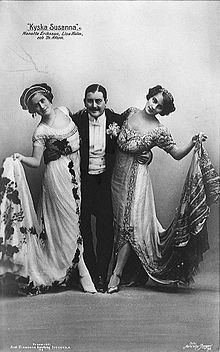- Die keusche Susanne
-
Die keusche Susanne (Chaste Susanne) is an operetta in three acts by Jean Gilbert. The German libretto was by Georg Okonkowski, based on the play Le fils à papa by Antony Mars and Maurice Desvallières. Jean Gilbert's son, Robert Gilbert prepared a revised version in 1953.
Contents
Performance history
It was first performed at the Wilhelm-Theater in Magdeburg on 26 February 1910. It was the composer's greatest success, enabling him to move to Berlin to become conductor of the Thalia-Theater.
Adapted into English, by Frederick Fenn and Arthur Wimperis, it was produced in London in 1912 as The Girl in the Taxi. Adapted back into French by Mars and Desvallières, it was produced in Paris and then Lyon in 1913 as La chaste Suzanne. It was also successful in South America in Italian (La casta Susana) and in Spanish (La chasta Suzanna). Gilbert conducted the work there two decades later when he was forced to leave Germany and move to Argentina. Even that was only one production of this operetta in Brazil, Susana[spelling?] is the most performed operetta in Brazil, and the only production was in São Paulo in 1970.[clarify][1]
Roles
 Three members of the cast of the first Swedish performance of Die keusche Susanne at the Oscarsteatern in Stockholm, 1911. Swedish acresses Manetta Eriksson (later Ryberg) and Lisa Holm are surrounding Norwegian actor Thorleif Allum.
Three members of the cast of the first Swedish performance of Die keusche Susanne at the Oscarsteatern in Stockholm, 1911. Swedish acresses Manetta Eriksson (later Ryberg) and Lisa Holm are surrounding Norwegian actor Thorleif Allum.
Role Voice type Premiere cast, 26 February 1910
(Conductor: Jean Gilbert)Susanne Fleuron soprano Fleuron, a parfumier, Susanne's husband baritone René Wildhagen tenor Baron Conrad von Felseneck bass Clementine von Felseneck, his wife contralto Pauline von Felseneck, their daughter soprano Paul von Felseneck, their son tenor Professor Hintzmeyer baritone Frau Rosa, his wife contralto Krause, head waiter at the Palais de Danse baritone Policeman baritone A servant soprano Professors, students, police, ball guests etc. Time and place: Berlin, about 1900
Instrumentation
The work is scored for an orchestra consisting of 2 flutes, 2 oboes, 2 clarinets, 2 bassoons, 4 french horns, 3 trumpets, 3 trombones, 1 guitar, 1 celesta, 1 harp, percussion and strings.
Films
A silent film version was made in 1926 by Richard Eichberg, starring Lilian Harvey, Willy Fritsch, Ruth Weyher, and Hans Wassmann. Novafilm Fernsehproduktion also made a version for television in 1972 directed by Thomas Engel with Maria Schell as Susanne.
A French-Spanish film production of the Spanish version La casta Susana (French: La chaste Suzanne) was made in 1963 by Luis César Amadori with Marujita Díaz, Carlos Estrada, Noël Roquevert and Chonette Laurent.
References
- ^ Opera Completa em São Paulo 1952–2003, Sergio Casoy[Full citation needed]
External links
- Die keusche Susanna page at Felix Bloch Erben site, accessed 8 January 2010
- Die keusche Susanne (Germany, 1926) at the Internet Movie Database
- La Casta Susana (Argentina, 1945) at the Internet Movie Database
- La Casta Susana (France/Spain, 1963) at the Internet Movie Database
- La Chaste Suzanne (France, 1937) at the Internet Movie Database
- Die keusche Susanna (Germany TV, 1972) at the Internet Movie Database
Categories:- Operas by Jean Gilbert
- German-language operettas
- 1910 operas
Wikimedia Foundation. 2010.
